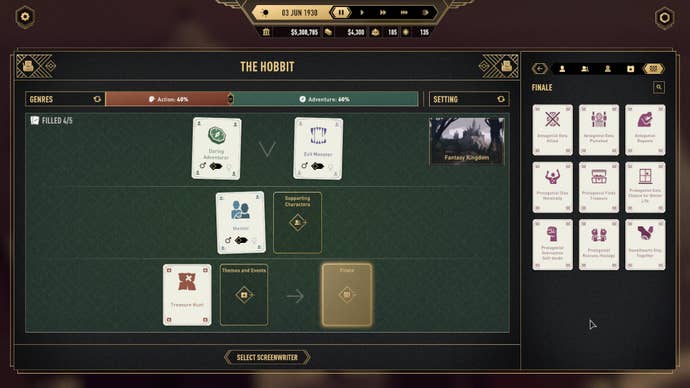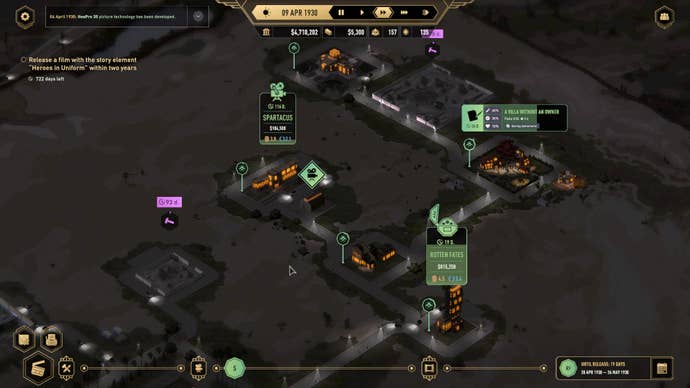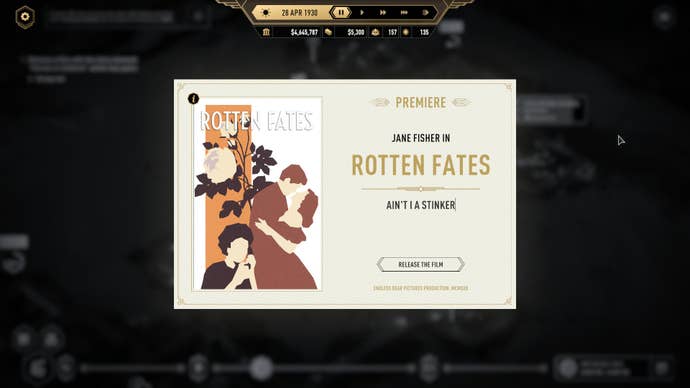When I inherited – pardon me, founded Endless Bear Studios at the flickering end of the Roaring Twenties, I had a dream. And that dream was to film Peter Jackson’s The Lord Of The Rings trilogy 30 years before Peter Jackson was born. Its one of many will-be classics I hope to “pre-make”, as it were. But ugh, these writers. There ain’t a single Jackson amongst ’em. I’ve got four on staff right now: one is a gambler, another likes to drink, the third is an incorrigible slacker, and the fourth is a recent hire who can barely use a typewriter. I spoonfed the gambler the rudiments of Spartacus, and he came back with some rancid applesauce about a knight and a criminal mastermind and a village of pixies. I told the tippler to write The Hobbit, and he cooked up a leaden three-hander with no wizard.

So I took everything back to formula: don’t worry about full scripts, you bums. Bolster your toolboxes. Give me new themes! Story components! A month or two later, there’s a knock at the door and my pipe-smoking V-necks stroll in brandishing what they proudly assure me is the future of cinema: nudity and “untamed sex”. They may be right, and in any case, I don’t have time to argue: I’ve lost a million dollars this year. So I’ve got the new guy working on a script for Basic Instinct.
This is Hollywood Animal, a Tinseltown tycoon sim that recently launched into early access. Beginning at the height of the prohibition era, it challenges you to build up a film studio from decade to decade and oversee every aspect of movie-making – hashing out plots, picking directors, producers and the cast, choosing cameras, sets and mics, budgeting for costumes and extras, renting cinemas, timing pre-release advertising, all the nuts and bolts. This broadly takes the form of plonking down structures on a square expanse of desert and levelling up the people or furnishings inside them, while following the journey of each production between departments, and dealing with myriad pop-up story events.
The latter are where you’ll generally encounter the seedier side of film-making through the ages: all the horrible wheeling-and-dealing that goes on in the backlots and boardrooms and bedrooms, all the cruelties and prejudices and accidents and skeletons shoved into closets. An example of the human element at work: one reason Endless Bear productions are so terrible at present is that a few months ago, the mayor of Los Angeles asked me to give his darling daughter a role in my next picture. I told him to go whistle, and now, the only LA construction company happy to take my calls are Dry Rot Inc (actual name redacted for legal reasons), which is why our new engineering department looks like it’s held together by cobwebs.

Another example of Hollywood politicking: our top actress, who made her name in silent movies, keeps going ‘on retreat’ to cultivate her voicebox. I think she spends six weeks at a time gargling molasses. That leaves us with a younger starlet who is as conceited as she is stilted, and who I’ve been using mostly to distract journalists when they ask about the speakeasy the set dressers definitely aren’t running behind our second sound stage. Amongst other problems, the younger actress is taller than my best leading man, which has led to the wrong kind of chemistry on the set of Flaming Fuzz, our latest romantic cop movie. It’s probably also going to cost us at the box office. This is the 1920s, remember. Everybody knows that tall women are witches.
These period dynamics, practical quagmires and flights of ego may sound annoying, but they’re crucial parts of what I am going to brazenly call ‘the magic’. I’m still undecided about Hollywood Animal as a tycoon sim, because I’m only on my first run: the key thing will be how many of the above beats and scenarios recur between runs, and whether there’s a path of least resistance you fall into when it comes to profitability. It’s already very enjoyable, however, as a story-making machine and a story about story-making machines.
It combines a passion for silverscreen alchemy with a thoroughly unromantic, conveyor-belt perspective of love, vengeance, mystery and humour as sliding percentages and playing cards to be dragged into boxes. Workshopping scripts involves jamming together archetypes like “Hopeless Romantic” and “Antagonist Repents”, with an initial limit of five components per movie. Somehow, the result isn’t that your films feel like works of barren arithmetic, because the conveyor belt is operated by a bunch of squabbling idiots, from janitors to composers, with quirks and demerits that lend even an obvious flop or a transparent money-spinner a sense of character.

In my efforts to film The Lord Of The Rings generations in advance, I have made several absolutely awful flicks. There was Rotten Fates – an amazing script tossed into the lap of a poorly equipped studio who promptly brute-forced it to the box office. If I’d held onto that script till I’d upgraded my wardrobe and set departments and hired superior actors, it could have been a timeless sensation – but I like the lumpy, aspirational B-movie I made instead. Similarly, I’m unabashedly hyped for Flaming Fuzz, even though I’m shooting it purely to appease the LA police chief, who rolled up one afternoon to complain that movies always make coppers look like fools.
The ratio of wonder and cynicism in Hollywood Animal is, I think, nicely captured by the colour palette. Los Angeles is a city founded on sand, and you’ll spend a lot of the game peering through a veil of blowing particles. Not just sand: gusts of cigarette smoke, sepia-washed coils of film, and all the dust, dust, dust of sordid human lives. But the art deco interface adds some glisten, and even the drabbest parts of the game look like surfaces you could see your face in, given enough polishing. It’s a grey world, fundamentally, but it’s always panning for gold.
Source link









Add comment